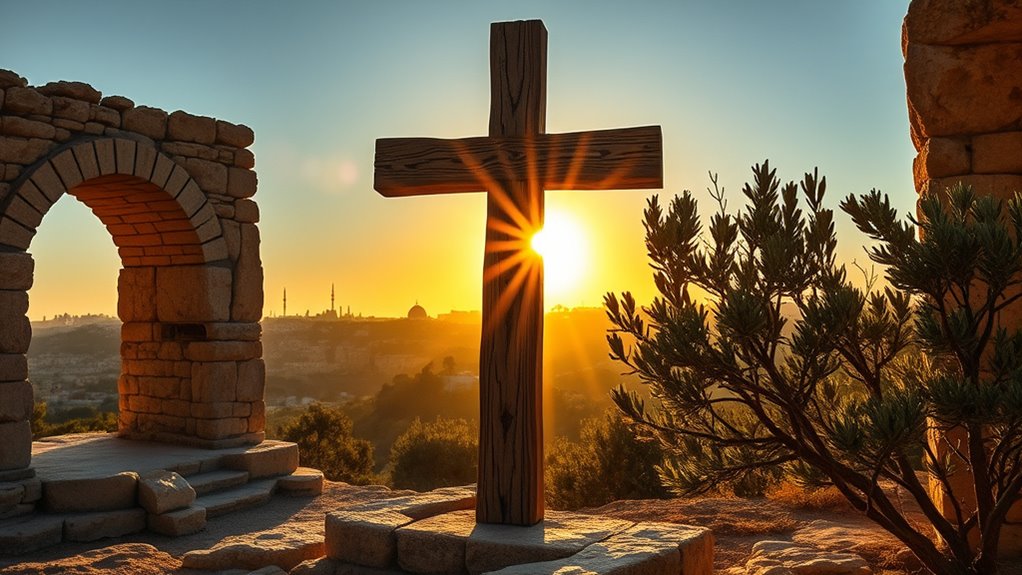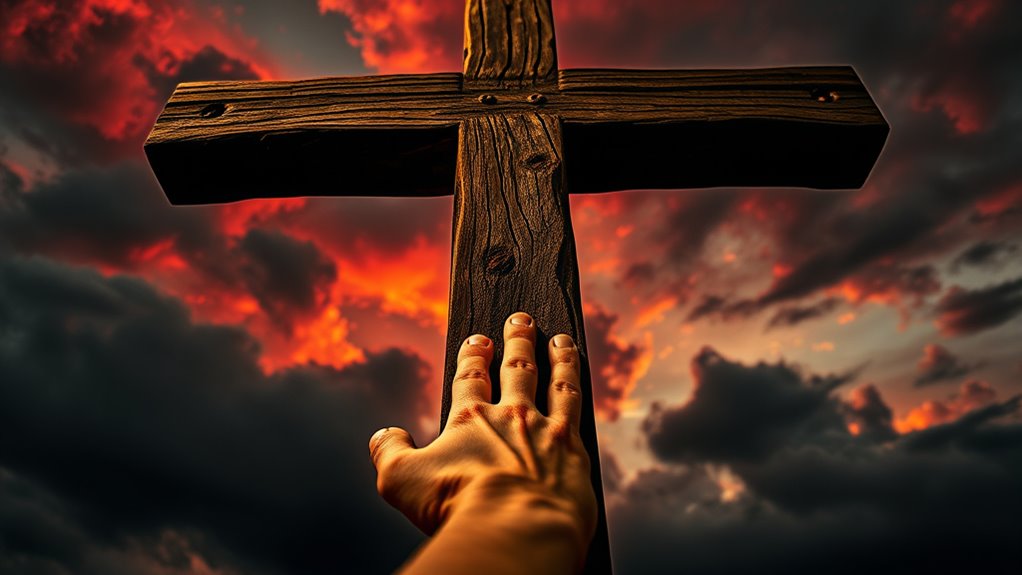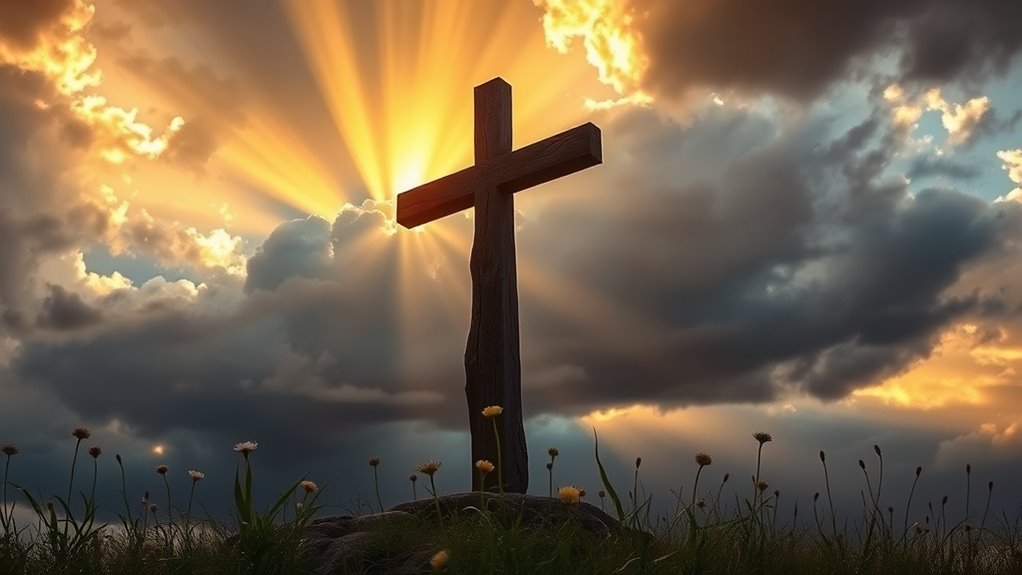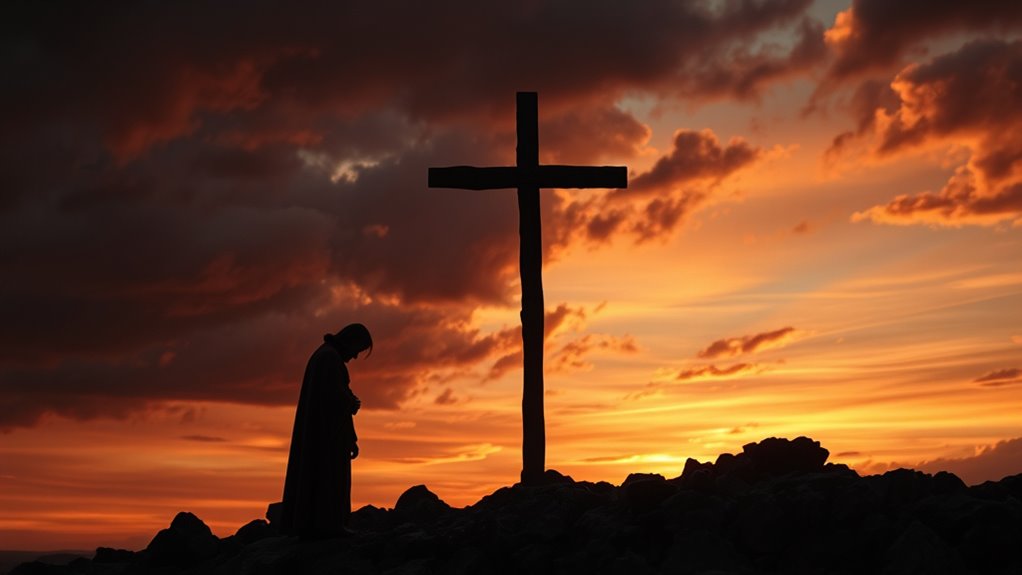Jesus had to die to fulfill God’s plan for redemption, atoning for your sins through His sacrificial death. His blood symbolizes love, forgiveness, and spiritual renewal, bridging the gap caused by sin. As the Lamb of God, He takes on the punishment you deserve, satisfying divine justice while offering mercy. This act of sacrifice reveals God’s perfect balance of justice and love—keep exploring for a deeper understanding of His profound significance.
Key Takeaways
- Jesus’ death serves as the ultimate sacrifice for humanity’s sins, fulfilling biblical prophecies and divine plans.
- His blood sacrifice symbolizes atonement, cleansing, and spiritual renewal for believers.
- Jesus acts as the innocent Lamb of God, substituting Himself to cover human sins.
- The crucifixion demonstrates God’s justice in punishing sin while offering mercy and forgiveness.
- His death restores the broken relationship between humans and God, inviting redemption and transformation.
The Significance of Sacrifice in Christian Faith

Why does sacrifice hold such a central place in Christian faith? It symbolizes the ultimate act of love and devotion—most notably through the blood sacrifice of Jesus. His death is seen as a profound act of spiritual renewal, offering believers a way to reconnect with God. The blood sacrifice signifies more than just death; it represents atonement, cleansing, and renewal of the soul. Jesus’s sacrifice demonstrates that true love involves self-giving, paving the way for forgiveness and new beginnings. This act invites believers to embrace spiritual renewal, shedding past misdeeds and starting fresh. Sacrifice, consequently, isn’t just about loss—it’s about transformation, hope, and the promise of eternal life through divine grace.
The Concept of Sin and the Need for Redemption

Understanding sin is essential to grasping the Christian message of redemption. Sin represents a breach in your relationship with God, highlighting your moral accountability for actions that separate you from Him. Throughout history, atonement rituals—such as sacrifices—have been used to bridge this gap, symbolizing the need for reconciliation. These rituals remind you that sin isn’t just about wrongdoing; it’s about the broken connection between you and your Creator. Because humans are inherently imperfect, redemption becomes necessary to restore this relationship. Jesus’s death is viewed as the ultimate act of atonement, satisfying divine justice and offering you a path to forgiveness. Recognizing the concept of sin helps you understand why Jesus’s sacrifice was needed to bring true redemption.
Jesus’ Role as the Lamb of God

As the Lamb of God, Jesus’s sacrifice holds deep significance in the story of redemption. His role fulfills ancient prophecy, showing that His death was part of God’s perfect plan. Understanding this helps you see why His sacrifice was necessary for salvation.
Sacrificial Lamb Significance
The image of Jesus as the Lamb of God emphasizes his role as the ultimate sacrificial offering for humanity’s sins. In ancient times, an animal sacrifice, often a ceremonial lamb, was used to atone for wrongdoings. These sacrifices symbolized the need for a perfect, innocent substitute to take the punishment deserved by people. Jesus’s life and death fulfill this symbolism, as he is portrayed as the perfect, sinless lamb who willingly offers himself. His sacrifice isn’t just an act of mercy; it’s a powerful symbol of substitution, where his death covers the sins of many. This significance transforms Jesus into the ultimate sacrificial lamb, highlighting the depth of God’s love and the importance of his death for spiritual reconciliation.
Fulfillment of Prophecy
Prophecy plays a essential role in revealing Jesus’s purpose as the Lamb of God, demonstrating that his sacrifice was foretold long before his arrival. The historical context of Jewish scriptures shows how ancient prophets predicted a suffering Messiah, emphasizing redemption through sacrifice. These prophecies carry significant cultural implications, shaping expectations for the Messiah’s role in salvation. When you understand these ancient texts, it becomes clear that Jesus’s death wasn’t accidental but a fulfillment of divine plan. His role as the Lamb of God aligns with the Passover lamb and other sacrificial traditions deeply embedded in Jewish culture. Recognizing these prophecies helps you see that Jesus’s death was not just a historical event but the culmination of long-standing divine promises.
The Fulfillment of Prophecy and Biblical Promises

Since biblical promises and prophecies point directly to the Messiah’s role, Jesus’ death can be seen as the ultimate fulfillment of these divine predictions. Throughout history, the historical context and cultural influences shaped these prophecies, making Jesus’ sacrifice a pivotal moment. You can see how ancient predictions, like those in Isaiah and Psalms, foretold suffering and redemption, aligning with Jesus’ crucifixion. These prophecies weren’t random; they reflected the hopes and religious beliefs of the Jewish people, influenced by their culture and history. Recognizing this connection helps you understand that Jesus’ death wasn’t just a tragedy but the fulfillment of divine assurances. It confirms that every prophecy was pointing toward God’s plan for salvation through the Messiah’s sacrifice.
Biblical prophecies reflect Jewish hopes and foretell Jesus’ sacrificial role in God’s salvation plan.
- Fulfillment of Old Testament covenants
- Cultural influences shaping biblical promises
- Jesus as the divine fulfillment of God’s plan
Divine Justice and Mercy Intertwined

Divine justice and mercy are deeply intertwined in the story of Jesus’ death, revealing how God’s nature balances fairness with compassion. God’s divine justice demands that sin be paid for, ensuring righteousness is upheld. At the same time, His mercy intertwined with justice shows that He chooses to forgive and offer salvation rather than condemn. Jesus’ sacrifice demonstrates this perfect harmony: justice is satisfied through His death, paying the penalty for humanity’s sins, while mercy flows freely, offering grace to all who believe. You see, God’s love doesn’t ignore justice; it fulfills it in a way that reveals His compassionate character. This intertwining of justice and mercy underscores why Jesus had to die—to reconcile divine fairness with unending mercy.
The Resurrection: Triumph Over Death and Sin

The resurrection of Jesus marks a pivotal victory over death and sin, transforming the meaning of His sacrifice. It embodies symbolic symbolism, representing renewal, hope, and divine power. Within its historical context, Jesus rising from the dead confirms His divine authority and fulfills promises made in Scripture. This event signifies that death is not the end, and sin’s power is broken. By rising, Jesus demonstrates triumph over the grave, offering believers assurance of eternal life. The resurrection also reinforces that faith in God’s plan leads to ultimate victory. It’s a reminder that, through Christ, new beginnings are possible, and spiritual renewal is within reach. This moment remains central to Christian belief, inspiring hope and reinforcing the significance of Jesus’ sacrifice in overcoming the greatest obstacles—death and sin.
The Impact of Jesus’ Death on Humanity Today

Have you ever wondered how Jesus’ death continues to influence your life today? His sacrifice shaped cultural implications, inspiring acts of compassion and forgiveness across centuries. It also offers a foundation for moral values rooted in love and redemption. Understanding the historical context reveals why His death was pivotal for shaping faith and societal norms.
| Aspect | Example | Impact |
|---|---|---|
| Cultural implications | Christian rituals and holidays | Foster community and identity |
| Historical context | Roman crucifixion and Jewish beliefs | Highlighted sacrifice and justice |
| Personal relevance | Forgiveness and hope in daily life | Promotes reconciliation |
Frequently Asked Questions
How Did Jesus’ Death Fulfill Old Testament Prophecies?
You see, Jesus’ death fulfilled Old Testament Messianic Prophecies by showing he was the promised Savior. Prophecies like Isaiah’s suffering servant and Psalm 22’s details about crucifixion pointed to his sacrifice. When Jesus died, it confirmed these ancient predictions, establishing him as the Messiah. His death wasn’t random; it was the divine plan to fulfill God’s promises in the Old Testament about salvation and redemption.
What Is the Significance of Jesus’ Sacrifice for Non-Christians?
Imagine a bridge connecting worlds, symbolizing Jesus’ sacrifice. For non-Christians, it’s an act of interfaith understanding, showing compassion beyond doctrine. His death reminds you of moral implications—selflessness and love that transcend beliefs. It invites you to see shared values, fostering unity and respect. This sacrifice, like a universal gift, encourages moral growth and deeper connections across diverse faiths, inspiring you to live with compassion and understanding.
Why Was a Sacrificial Death Necessary for Salvation?
You might wonder why a sacrificial death was necessary for salvation. The atonement necessity lies in restoring your relationship with God, which sin had broken. Jesus’ death serves as divine substitution, where He takes your place, paying the penalty you deserve. This act of love bridges the gap, offering forgiveness and eternal life. Without this divine substitution, there’d be no way for you to be reconciled with God.
How Does Jesus’ Death Demonstrate God’s Love and Justice?
Imagine witnessing the ultimate act of divine mercy—Jesus’ death. It reveals God’s love by offering atonement for your sins, showing He cares deeply for you. His sacrifice also upholds justice, balancing mercy with righteousness. This act embodies atonement theology, where God’s justice is satisfied through love. You see that God’s love isn’t just emotional; it’s active, sacrificial, ensuring your salvation while demonstrating perfect justice and mercy intertwined.
What Implications Does Jesus’ Death Have for Modern Faith Practices?
Your faith is deeply impacted by Jesus’ death, serving as a symbolic ritual that reminds you of God’s love and sacrifice. It encourages faith renewal, inspiring you to reflect on forgiveness and redemption. This event shapes modern practices by emphasizing compassion and sacrifice, helping you grow spiritually. Through this understanding, you can find renewed hope and purpose, making Jesus’ death a powerful cornerstone of your faith journey today.
Conclusion
Your understanding of why Jesus had to die deepens as you see it wasn’t just about history, but about offering you redemption and hope. Imagine someone carrying a heavy burden—Jesus’s sacrifice lifts that for you. Like a friend stepping in during your darkest hour, His death and resurrection remind you that love and mercy can triumph over sin and death, giving you a new chance to live with purpose and faith.









